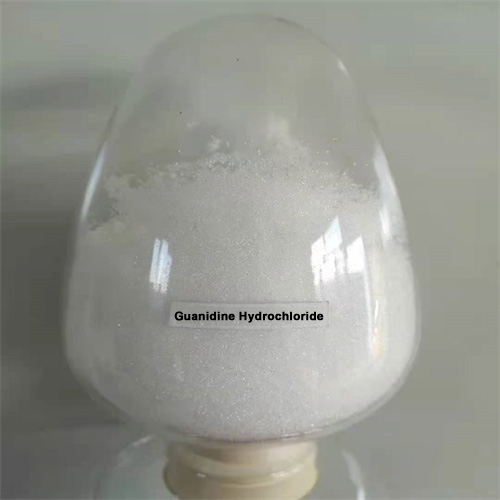
- English
- Español
- Português
- русский
- Français
- 日本語
- Deutsch
- tiếng Việt
- Italiano
- Nederlands
- ภาษาไทย
- Polski
- 한국어
- Svenska
- magyar
- Malay
- বাংলা ভাষার
- Dansk
- Suomi
- हिन्दी
- Pilipino
- Türkçe
- Gaeilge
- العربية
- Indonesia
- Norsk
- تمل
- český
- ελληνικά
- український
- Javanese
- فارسی
- தமிழ்
- తెలుగు
- नेपाली
- Burmese
- български
- ລາວ
- Latine
- Қазақша
- Euskal
- Azərbaycan
- Slovenský jazyk
- Македонски
- Lietuvos
- Eesti Keel
- Română
- Slovenski
- मराठी
- Srpski језик
The role of Guanidine Hydrochloride in protein denaturation
2021-10-18
Proteins are more susceptible to external factors (temperature, denaturants, etc.) to undergo conformational changes, leading to loss of activity and abnormal changes in physical and chemical properties. This process is called protein denaturation. Guanidine hydrochloride is an important denaturant, which can produce a strong denaturing effect, which includes two denaturation mechanisms.
One is the solubilization effect of guanidine hydrochloride on hydrophobic amino acid residues. Guanidine hydrochloride can break the hydrogen bonds in the protein structure, which increases the solubility of non-polar molecules including amino acid side chains and reduces hydrophobic interactions; another mechanism is that denatured proteins can preferentially bind with guanidine hydrochloride to form denatured proteins -Denaturant complex. When the complex is removed, the reaction balance shifts to the right, and the protein in its natural state is continuously transformed into a complex, eventually leading to complete denaturation of the protein. However, the binding of denaturing agents to denatured proteins is very weak, and only high concentrations of denaturing agents can cause complete denaturation of proteins. In general, the denaturation caused by guanidine hydrochloride is usually reversible.

One is the solubilization effect of guanidine hydrochloride on hydrophobic amino acid residues. Guanidine hydrochloride can break the hydrogen bonds in the protein structure, which increases the solubility of non-polar molecules including amino acid side chains and reduces hydrophobic interactions; another mechanism is that denatured proteins can preferentially bind with guanidine hydrochloride to form denatured proteins -Denaturant complex. When the complex is removed, the reaction balance shifts to the right, and the protein in its natural state is continuously transformed into a complex, eventually leading to complete denaturation of the protein. However, the binding of denaturing agents to denatured proteins is very weak, and only high concentrations of denaturing agents can cause complete denaturation of proteins. In general, the denaturation caused by guanidine hydrochloride is usually reversible.




